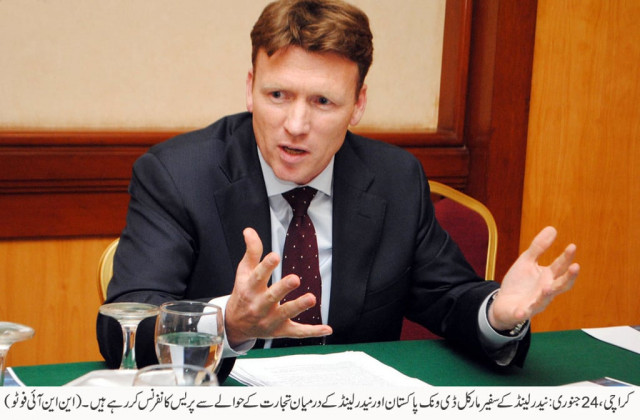Trade, not aid: GSP+ can lead to more than just rise in textile exports
Dutch envoy says bilateral trade should be much higher than current level.

"Pakistan’s problem lies in transporting (agricultural) goods rather than growing them," says Dutch Ambassador Marcel de Vink
“With the help of GSP Plus, Pakistan can improve various other industries and diversify its export portfolio rather than becoming overly dependent on a select few industries,” he suggested while speaking to the media here on Friday.
After talking about how the duty-free status can help Pakistan in general, the ambassador focused on trade relations between Pakistan and the Netherlands.
“At the moment, total trade between the two countries is $800 million,” he revealed. “While this is an acceptable figure, it can be much more, especially considering that we are one of the top 20 economies and Pakistan is the sixth largest country.”

De Vink said there was a lot of room for improvement in both imports and exports, adding in his meeting with Sindh Chief Minister Qaim Ali Shah, earlier in the day, he had highlighted water treatment, agriculture and energy as the main industries for Dutch investment.
“Despite being a relatively small country, we are the second largest exporter of agricultural goods in the world,” he said. “We can help in this regard, especially with logistics, since I believe that Pakistan’s problem lies in transporting the goods in an efficient manner rather than growing them.”
De Vink added he was striving to encourage Dutch companies to invest in the country. “We already have some of our biggest companies in Pakistan but I think smaller firms should also invest here,” he felt. “I think economic dynamics between the two countries have shifted from aid to trade.”
When asked how he convinced businesses to invest in Pakistan, he said he pointed to the multitude of multinational companies in Karachi and then argued that there must be some reason for their presence.
However, he was quick to point out that the security situation, especially in the country’s industrial capital, needed to improve.
Published in The Express Tribune, January 25th, 2014.
Like Business on Facebook, follow @TribuneBiz on Twitter to stay informed and join in the conversation.



















COMMENTS
Comments are moderated and generally will be posted if they are on-topic and not abusive.
For more information, please see our Comments FAQ